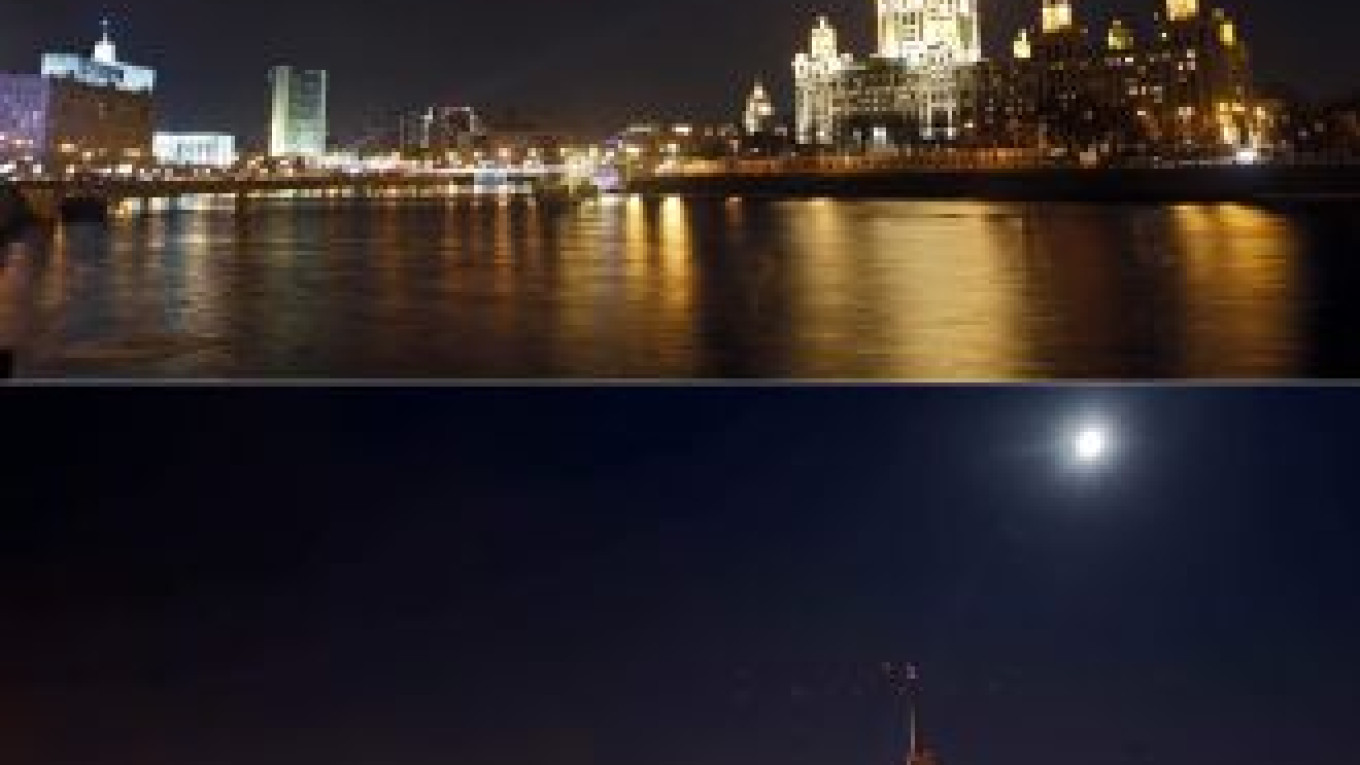Moscow State University fell dark over the weekend, following Sydney's Opera House and Beijing's Forbidden City in joining a global climate change protest, as lights were switched off across the world to mark the Earth Hour event.
Millions of people turned off lights and appliances for an hour from 8:30 p.m. Saturday in a gesture to highlight environmental concerns and to call for a binding pact to cut greenhouse gas emissions. This year's was the fourth annual Earth Hour, organized by the World Wildlife Fund.
As each time zone reaches the appointed hour, skylines go dark and landmarks dim, from a Manila shopping mall to Berlin's Brandenburg Gate and the Empire State Building in New York.
Some 4,000 cities in more than 120 countries — starting with the remote Chatham Islands off the coast of New Zealand — voluntarily switched off Saturday to reduce energy consumption, though traffic lights and other safety features were unaffected, organizers said.
"We have everyone from Casablanca to the safari camps of Namibia and Tanzania taking part," said Greg Bourne, CEO of World Wildlife Fund in Australia, which started Earth Hour in 2007 in Sydney before it spread to every continent.
The iconic and imposing Moscow State University, perched on a hill overlooking the city, all but disappeared into the darkness as Russia took part in the protest.
The gigantic Luzhniki Stadium nearby also went black, as did the skyscraping Ukraina Hotel downtown.
Russian officials succeeded in beating last year's national participation figure of more than 6 million people in 20 cities across the country. About 40 cities had taken part by the time the event reached Moscow, including Far East spots like Kamchatka and Irkutsk, which joined their Asian neighbors in switching off earlier. Restaurants in Vladivostok held a so-called Candle Evening, promoting Earth Hour as a chance for romance.
In Katmandu, Nepal — where electricity supplies are not constant — protesters unable to turn out lights held a candlelight vigil, while in the Maldives the state broadcaster ceased transmission for an hour to mark the event, WWF said.
Organizers hoped that the event would put pressure on global lawmakers to push for clear progress in agreeing on a binding international pact to reduce greenhouse gas emissions.
While France's Eiffel Tower dimmed its lights only briefly for security reasons — switching off for five minutes, rather than a full hour — other city landmarks, including the Arc de Triomphe were in darkness for the duration of the protest.
Organizers say there's no uniform way to measure how much energy is saved worldwide during the event, but hope that global participation will send a message to leaders that people worldwide are worried about global warming.
"What we're still looking for in this coming year is a global deal that encourages all countries to lower their emissions," said Andy Ridley, a WWF worker in Sydney who came up with the idea of Earth Hour in a pub with friends.
He said he hoped that this year's event would inspire world leaders to strive for a climate change deal that would hold nations to rules for reducing greenhouse gas emissions — blamed for global warming.
"China is going to have to be a big part of that, but so is every other major economy," Ridley said.
Giant panda Mei Lan led events in 30 Chinese cities, walking onto a platform amid dimming lights in her enclosure at the Chengdu Panda Breeding Research Center in the southwestern province of Sichuan, said Chris Chaplin of WWF in China. Lights were also turned off in Beijing's imperial palace known as the Forbidden City.
A Message from The Moscow Times:
Dear readers,
We are facing unprecedented challenges. Russia's Prosecutor General's Office has designated The Moscow Times as an "undesirable" organization, criminalizing our work and putting our staff at risk of prosecution. This follows our earlier unjust labeling as a "foreign agent."
These actions are direct attempts to silence independent journalism in Russia. The authorities claim our work "discredits the decisions of the Russian leadership." We see things differently: we strive to provide accurate, unbiased reporting on Russia.
We, the journalists of The Moscow Times, refuse to be silenced. But to continue our work, we need your help.
Your support, no matter how small, makes a world of difference. If you can, please support us monthly starting from just $2. It's quick to set up, and every contribution makes a significant impact.
By supporting The Moscow Times, you're defending open, independent journalism in the face of repression. Thank you for standing with us.
Remind me later.


